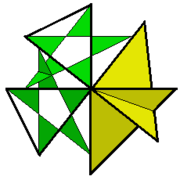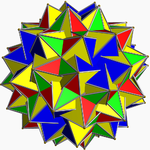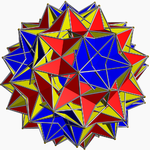Great dirhombicosidodecahedron
| Great dirhombicosidodecahedron | |
|---|---|

| |
| Type | Uniform star polyhedron |
| Elements | F = 124, E = 240 V = 60 (χ = −56) |
| Faces by sides | 40{3}+60{4}+24{5/2} |
| Coxeter diagram | |
| Wythoff symbol | | 3/2 5/3 3 5/2 |
| Symmetry group | Ih, [5,3], *532 |
| Index references | U75, C92, W119 |
| Dual polyhedron | Great dirhombicosidodecacron |
| Vertex figure |  4.5/3.4.3.4.5/2.4.3/2 |
| Bowers acronym | Gidrid |

In geometry, the great dirhombicosidodecahedron (or great snub disicosidisdodecahedron) is a nonconvex uniform polyhedron, indexed last as U75. It has 124 faces (40 triangles, 60 squares, and 24 pentagrams), 240 edges, and 60 vertices.[1]
This is the only non-degenerate uniform polyhedron with more than six faces meeting at a vertex. Each vertex has 4 squares which pass through the vertex central axis (and thus through the centre of the figure), alternating with two triangles and two pentagrams. Another unusual feature is that the faces all occur in coplanar pairs.
This is also the only uniform polyhedron that cannot be made by the Wythoff construction from a spherical triangle. It has a special Wythoff symbol | 3⁄2 5⁄3 3 5⁄2, relating it to a spherical quadrilateral. This symbol suggests that it is a sort of snub polyhedron, except that instead of the non-snub faces being surrounded by snub triangles as in most snub polyhedra, they are surrounded by snub squares.
It has been nicknamed "Miller's monster" (after J. C. P. Miller, who with H. S. M. Coxeter and M. S. Longuet-Higgins enumerated the uniform polyhedra in 1954).
Related polyhedra
[edit]If the definition of a uniform polyhedron is relaxed to allow any even number of faces adjacent to an edge, then this definition gives rise to one further polyhedron: the great disnub dirhombidodecahedron which has the same vertices and edges but with a different arrangement of triangular faces.
The vertices and edges are also shared with the uniform compounds of 20 octahedra or 20 tetrahemihexahedra. 180 of the 240 edges are shared with the great snub dodecicosidodecahedron.
 Convex hull |
 Great snub dodecicosidodecahedron |
 Great dirhombicosidodecahedron |
 Great disnub dirhombidodecahedron |
 Compound of twenty octahedra |
 Compound of twenty tetrahemihexahedra |
This polyhedron is related to the nonconvex great rhombicosidodecahedron (quasirhombicosidodecahedron) by a branched cover: there is a function from the great dirhombicosidodecahedron to the quasirhombicosidodecahedron that is 2-to-1 everywhere, except for the vertices.[2]
Cartesian coordinates
[edit]Let the point be given by
- ,
where is the golden ratio. Let the matrix be given by
- .
is the rotation around the axis by an angle of , counterclockwise. Let the linear transformations be the transformations which send a point to the even permutations of with an even number of minus signs. The transformations constitute the group of rotational symmetries of a regular tetrahedron. The transformations , constitute the group of rotational symmetries of a regular icosahedron. Then the 60 points are the vertices of a great dirhombicosidodecahedron. The edge length equals , the circumradius equals , and the midradius equals .
For a great dirhombicosidodecahedron whose edge length is 1, the circumradius is
- .
Its midradius is
- .
Gallery
[edit]
 Traditional filling |
 Modulo-2 filling |
 Interior view, modulo-2 filling |
References
[edit]- Coxeter, Harold Scott MacDonald; Longuet-Higgins, M. S.; Miller, J. C. P. (1954), "Uniform polyhedra", Philosophical Transactions of the Royal Society of London. Series A. Mathematical and Physical Sciences, 246 (916): 401–450, Bibcode:1954RSPTA.246..401C, doi:10.1098/rsta.1954.0003, ISSN 0080-4614, JSTOR 91532, MR 0062446, S2CID 202575183
- Wenninger, Magnus (1974). Polyhedron Models. Cambridge University Press. ISBN 0-521-09859-9. OCLC 1738087.
- Har'El, Z. Uniform Solution for Uniform Polyhedra., Geometriae Dedicata 47, 57-110, 1993. Zvi Har’El, Kaleido software, Images, dual images
- Mäder, R. E. Uniform Polyhedra. Mathematica J. 3, 48-57, 1993.
- Klitzing, Richard. "3D uniform polyhedra".
- ^ Maeder, Roman. "75: great dirhombicosidodecahedron". MathConsult.
- ^ "Great Dirhombicosidodecahedron". Archived from the original on 2018-10-18. Retrieved 2022-07-24.